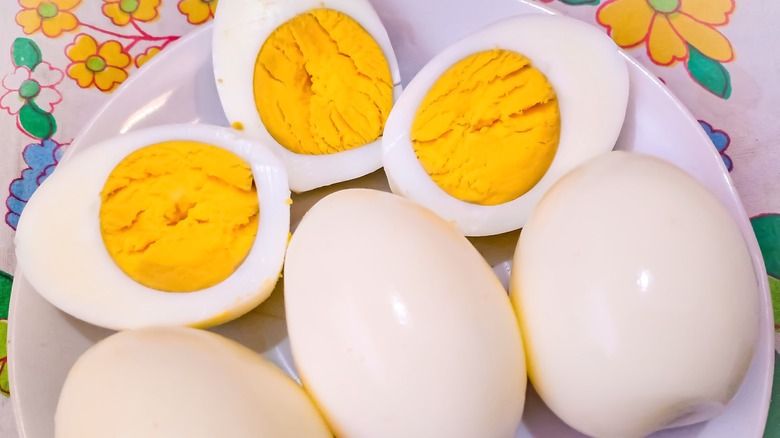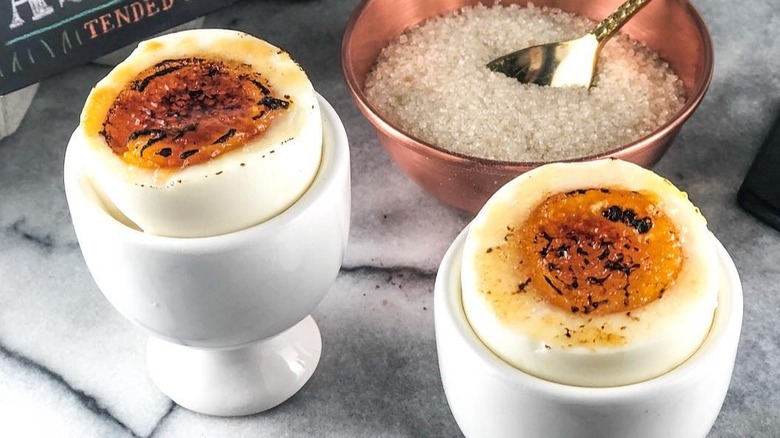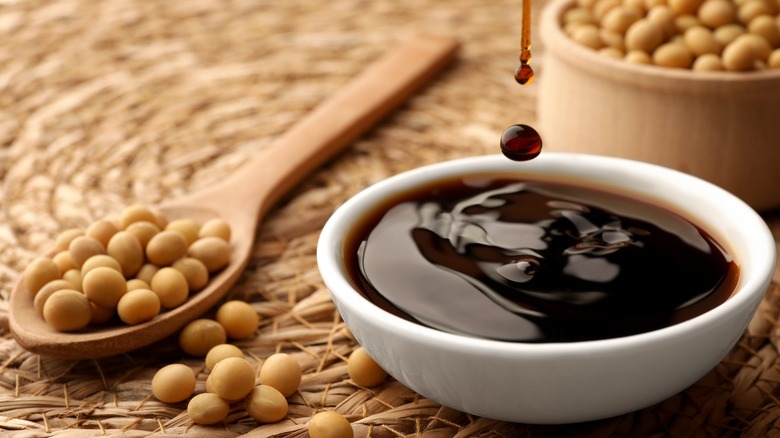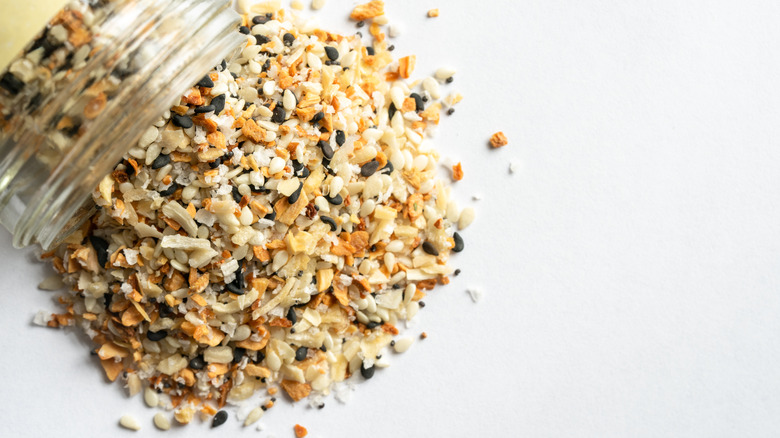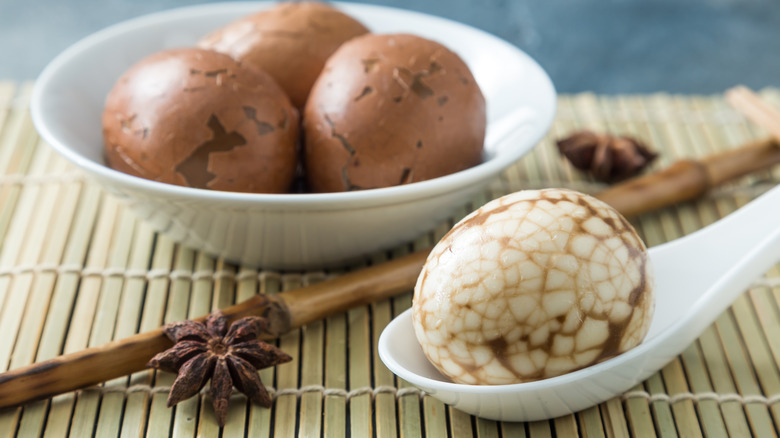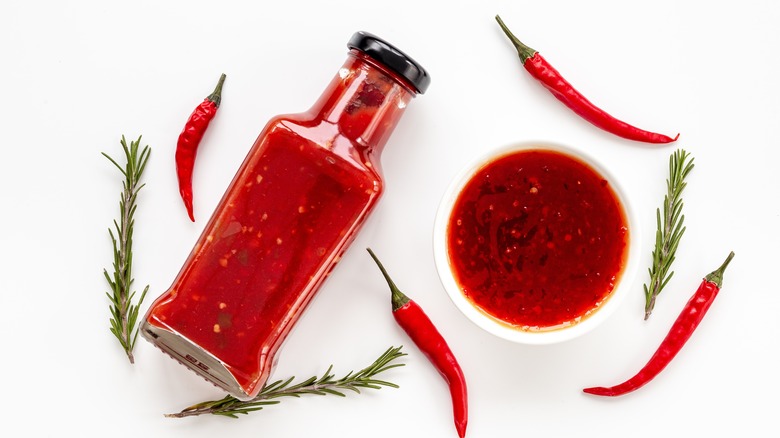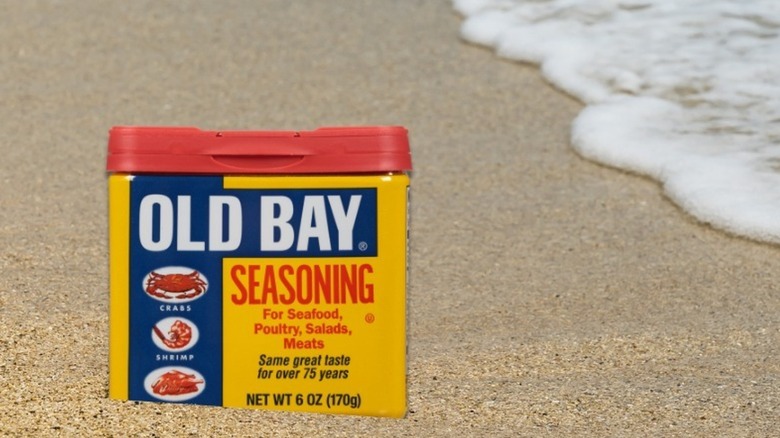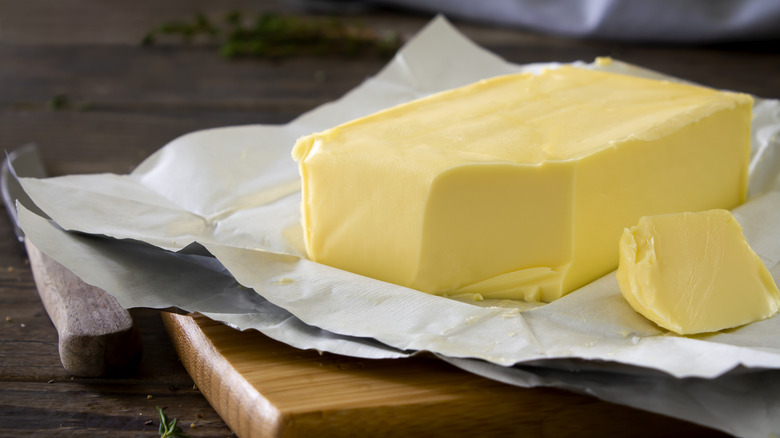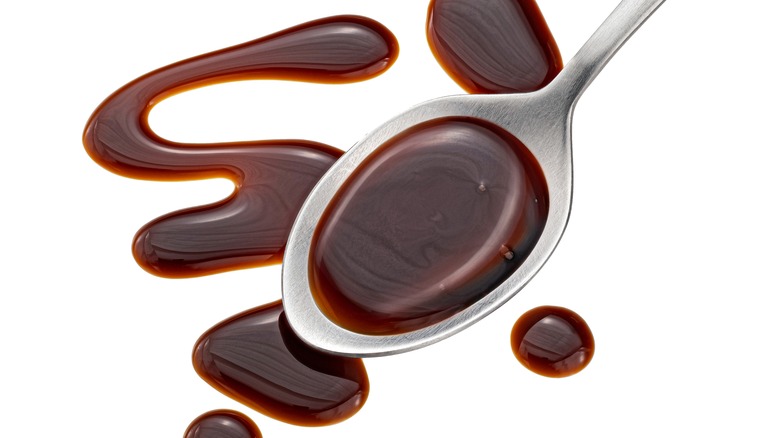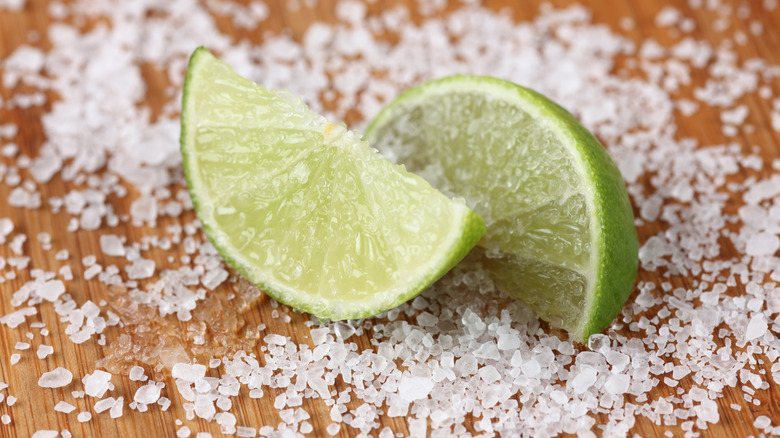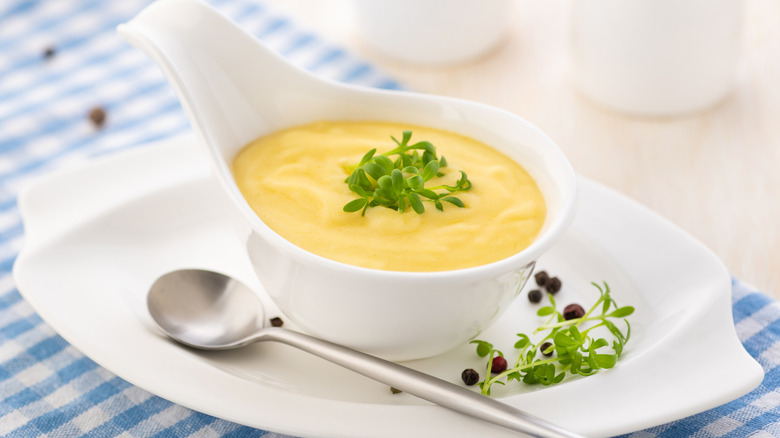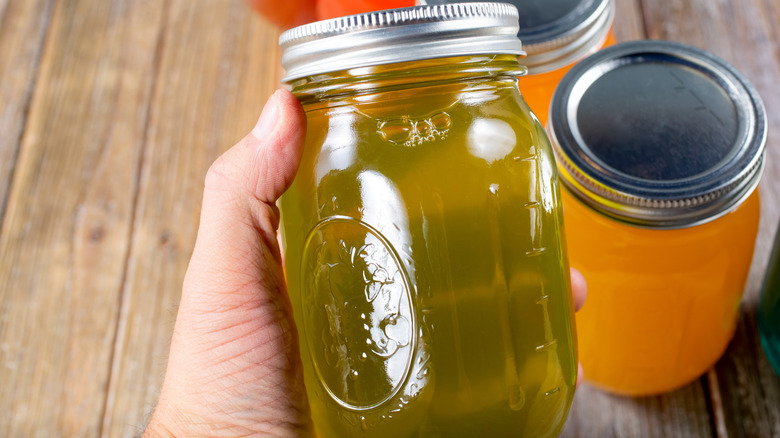14 Ways To Upgrade Hard-Boiled Eggs
Hard-boiled eggs are simple, nutritious, and undeniably convenient. Whether you eat them as a quick on-the-go breakfast or as a protein-packed snack between meals, these tasty orbs play a vital role in our daily routines. But let's face it, eating them plain day after day can leave even the most devoted egg enthusiast longing for something more. Thankfully, it's easy to create something new with just a dash of creativity and a few simple ingredients.
That's where this guide comes in. In it, you'll find more than a dozen ways to upgrade your hard-boiled eggs. From the slight sweetness of egg brûlée to the intriguing spiciness of Chinese tea eggs, there's a recipe here to suit every palate. We'll also explore the benefits of single-ingredient upgrades like everything bagel seasoning, hot sauce, and butter for moments when you're short on time. By the end, you'll stop seeing your daily eggs as mundane morsels and start seeing them as versatile canvases for fulfilling all of your cravings.
Sugar and heat turn hard-boiled eggs into egg brûlée
There are countless ways to prepare eggs: scrambling, frying, poaching, and more. Even when you limit yourself to hard-boiled eggs, the options seem endless. Add salt for a quick snack, chop them up to make egg salad, or mash them with mayonnaise and mustard to make deviled eggs. If you fancy yourself an egg aficionado, chances are you've experimented with all these methods and then some. But just when you think you've seen it all, along comes a new contender: egg brûlée.
Though the technique may be novel, the idea behind isn't. Similar to the dessert, egg brûlée involves using a kitchen torch to caramelize the surface, transforming ordinary eggs into a breakfast masterpiece. The process begins with boiling the eggs and then halving them. A sprinkle of salt followed by a dusting of sugar comes next. As you can probably guess, the sugar facilitates caramelization while the salt helps balance the sweetness. Feel free to use whichever salt and sugar you have on hand, but try flaky sea salt (such as Maldon) and turbinado sugar for an extra special touch. With the ingredients in place, carefully torch the eggs using low heat to avoid scorching. They're ready when the sugar begins to bubble and caramelize. On the palate, they offer a delightful sweetness with subtle hints of fudgy caramel.
Milk and seasonings create oeufs Jeanette
Jacques Pépin's name is synonymous with expertise and innovation in the culinary world. Throughout his remarkable career, the French chef has penned 30 cookbooks, taught culinary arts at Boston University, and contributed to dozens of esteemed food magazines. In addition, he has shared his knowledge with millions of home cooks, helping them perfect dishes like braised duck, crêpes, and souffles. However, his inventive approach to eggs is what truly sets him apart.
One of Jacques Pépin's most captivating creations is oeufs Jeanette (eggs Jeanette), a tribute to his mother who introduced him to the dish. Pepin unveiled this recipe in his 2011 cookbook, "The Essential Pépin." The dish involves boiling and peeling the eggs, then mashing the yolks with garlic, parsley, milk, salt, and pepper before refilling the egg whites with the mixture. These stuffed eggs are then seared, filling-side down until they develop a beautiful golden-brown crust. A dressing made out of the leftover filling, olive oil, Dijon mustard, water, and black pepper adds the final touch. It sounds simple enough, but what makes this dish so special is the juxtaposition of the crisp, charred exterior and the creamy yolk bursting with rich, toasty notes.
Soy sauce gives eggs an Asian twist
Believe it or not, there are no fewer than eight types of soy sauce on the market. This will probably come as a surprise for those unacquainted with Asian cooking, but those in the know have probably heard of more popular varieties such as tamari and liquid aminos. Whether you're a soy sauce novice or a seasoned pro, this simple ingredient is the key to creating Asian-inspired hard-boiled eggs.
You have the freedom to choose your preferred soy sauce when making this recipe. Opt for low-sodium soy sauce for a more subdued flavor or the dark variety for a richer taste profile. Once you've made your selection, pour the soy sauce into a jar or deep container, then add the peeled, hard-boiled eggs and allow them to marinate for several hours or overnight. Keep in mind that the longer they soak, the saltier and more intense the flavor will become, so adjust the marinating time to suit your preferences.
As for serving, enjoy the eggs on their own as a snack, or try dressing them up with cracked black pepper, sesame oil, or pickled onions. They also make a tasty addition to dishes like ramen, rice, or salad. Feel free to experiment with different marinades as well. For example, you can add rice vinegar for tanginess, chili sauce for heat, or a bit of sugar to balance the saltiness.
Everything bagel seasoning provides toasty, nutty notes
Made up of a blend of white and black sesame seeds, poppy seeds, dried minced garlic, and dried minced onion, everything bagel seasoning is one of the tastiest and most versatile spice blends you'll encounter. Its versatility extends far beyond its namesake, elevating foods as diverse as pasta, salads, and fries. Given its wide-ranging appeal, it's a natural choice to enhance the flavor of hard-boiled eggs as well.
Sprinkling the seasoning on eggs works on several levels. For starters, the dried aromatics enliven the flavor of the eggs. More specifically, the onions contribute sweet, savory notes, while the garlic adds a punchy, slightly spicy flavor. In this way, they balance the richness and creaminess of the eggs, creating an irresistible flavor profile. Meanwhile, the seeds introduce nutty, subtly sweet undertones that complement the eggs' richness. The addition of salt is a no-brainer, intensifying all the flavor components present. Furthermore, these seasonings provide a satisfying crunch that contrasts with the eggs' soft texture, adding interest to each bite.
Use warming spices and tea to create Chinese tea eggs
Beautiful and intriguing probably aren't words that come to mind when you think about hard-boiled eggs, but that's exactly what tea eggs are all about. This savory snack, which is a staple street-food breakfast for busy commuters in China, brings together a handful of ingredients and a unique preparation method to create eggs with an unmistakable marbled look.
To bring the taste of China into your kitchen, start by hard-boiling eggs as usual and allowing them to cool in an ice bath. Once cooled, gently crack the eggshells using a small spoon. Then, prepare the brining liquid by combining black tea (either leaves or bags), an array of spices such as ginger, star anise, cinnamon stick, bay leaves, and Sichuan peppercorns, along with soy sauce, sugar, and water. You can add, a splash of rice wine for more depth, although a simpler version using just tea, soy sauce, and Chinese five-spice is just as tasty. Bring the mixture to a boil, simmer, and let cool before submerging the eggs. Let them soak for a day.
When you remove the shells, you'll be greeted with intricately patterned eggs that are almost too exquisite to eat. But resist the temptation to display them, as their flavor is equally remarkable. With a savory, slightly salty profile complemented by hints of sweetness and spice, these tea eggs are sure to leave your taste buds eager for more.
Hot sauce is an easy way to turn up the heat
If you ask any spice enthusiast what they keep in their pocket, chances are they'll whip out a bottle of their beloved hot sauce. While this might seem quirky to those less obsessed with spicy flavors, for fans of heat, it's an essential condiment. Whether it's pizza, rice, or eggs, they'll eagerly drizzle a few drops to add some excitement.
Before you dismiss hot sauce aficionados for lacking culinary sophistication, let's explore why this condiment pairs so well with hard-boiled eggs. On the most basic level, hot sauce provides an infusion of flavor that contrasts with the mild flavor of eggs. Specifically, many contain acidic ingredients like vinegar, which perks up the flavor of eggs with a tangy kick. Moreover, some hot sauces boast ingredients rich in umami, such as tomatoes, which enhance the savory aspect of eggs, making them even more delicious.
Old Bay lends sweet, spicy, and savory notes to hard-boiled eggs
As you might have guessed by its name and packaging, Old Bay was originally created as a seafood seasoning, particularly for crab and shrimp. However, its uses have expanded dramatically over time. With a flavor profile that dances between sweet, spicy, and savory, it's now a go-to seasoning for everything from corn on the cob to hard-boiled eggs.
Old Bay is a complex blend of 18 spices, including paprika, red and black pepper, and celery salt. Similar to other closely guarded recipes like Coca-Cola and KFC's 11 herbs and spices, the exact composition is a mystery. Nevertheless, substitutes often include dry mustard, mace, and warming spices such as cinnamon, cardamom, cloves, and allspice. The spicy kick from the paprika and pepper adds subtle heat and earthy complexity, while also providing an eye-catching visual appeal. Meanwhile, celery salt brings a touch of saltiness that enhances the eggs' natural flavors and adds savory depth to the dish. The addition of warming spices adds a surprising hint of sweetness, balancing out the mix of salty, spicy, and savory flavors.
A dab of mustard gives deviled egg vibes
There's no denying the deliciousness of deviled eggs. Mixing mashed egg yolks with mayonnaise, crème fraîche, Dijon mustard, and salt, then stuffing them back into the egg whites and finishing with a sprinkle of paprika — what's not to love about that? But sometimes, even simple deviled egg recipes can feel too time-consuming and draining. That's when having a quick shortcut to deviled eggs comes in handy.
To be clear, no shortcut can fully match the depth of flavor in a traditional deviled egg recipe. However, adding just a dab of mustard to hard-boiled eggs comes surprisingly close. The vinegary acidity of mustard does wonders here, balancing out the richness of the eggs and giving them a brighter, more flavorful taste. Along with its tanginess, mustard adds spicy and sometimes sweet notes, depending on the type you use. Regardless of your choice, mustard's complex flavor profile is sure to elevate your everyday egg routine to new heights.
Add butter for creamy and salty notes
Some hard-boiled egg upgrades, like mustard, hot sauce, and soy sauce, just belong together. They're as perfect a match as Blake Lively and Ryan Reynolds. But then there are others, like the next idea, that might leave you scratching your head (or even feeling a bit squeamish). The surprising ingredient in question? Butter.
Butter is undoubtedly a kitchen staple. Spread it on toast, use it to sauté vegetables, or whip it into a roux. But adding a pat of butter to hard-boiled eggs? It seems to defy all culinary logic. However, if you're willing to take a leap of faith, you'll discover a delightful egg upgrade awaiting you. But, don't settle for any old butter. Opt for the good stuff — European or Irish butter is your best bet. With a higher fat content than standard American butter, they boast a richer, more buttery flavor profile. Simply slice a healthy nub, mash it into hard-boiled eggs, and season with salt and pepper. Your taste buds won't know what hit them.
Tajín transports your eggs to Mexico
Not to be confused with tagine, a Moroccan meat and vegetable stew, Tajín is a Mexican spice blend containing a blend of ground red chilies, dried lime juice, and sea salt. Together, these elements create a spicy, citrusy, and salty fusion. Fruit, corn, and cocktail rims tend to get all of the attention when it comes to the best uses for Tajín, but like every delicious spice blend, its versatility extends much further.
Although the mash-up of Tajín and hard-boiled eggs may seem odd at first glance, a closer look at the ingredients reveals why it's a winning combination. The tangy citrus punch from the dried lime juice cuts through the eggs' richness, keeping your taste buds engaged. Meanwhile, the chili peppers add a gentle heat that complements the citrusy notes perfectly. This subtle spiciness provides just the right amount of kick without overpowering the eggs. Finally, Tajín's salt enhances the eggs' natural flavor and balances out the tangy and spicy elements.
Drizzle balsamic vinegar for sweet, fruity flavor notes
You may not realize it, but there are all kinds of unique ways to use balsamic vinegar. For instance, you can stir it into seltzer water to create a kombucha taste-alike, use it as a meat marinade, or incorporate it into cabbage slaw. What makes it so adaptable is its perfect balance of acidity and sweetness.
When drizzled over hard-boiled eggs, the slight tanginess contrasts perfectly with the rich, fattiness of the eggs, creating balance. On the sweet side of things, the complex undertones of molasses, fig, and prune add just the right touch of sweetness without veering into dessert territory. Additionally, its syrupy texture envelops the eggs, giving them a luxurious mouthfeel with every bite and elevating your standard eggs into a morning indulgence.
As wonderful a pairing as this is, there are a few things to keep in mind. Firstly, it's unlikely that you'll be using authentic balsamic vinegar, as it's rare and expensive. But don't worry, even the imitations provide interesting flavors that will keep your taste buds engaged. Secondly, moderation is key — just a quick drizzle is all you need to add a powerful finishing touch.
Try lime juice and salt for tequila-inspired eggs
Whether you're teetotaling or simply not up for tequila shots anymore, chances are you haven't tasted lime juice and salt together in a while. That's a shame because it's one of the punchiest flavor combinations in existence. Thankfully, you can recreate tequila shot memories without the shot glasses, hangovers, and regrets.
A few squeezes of lime juice — check out this lime-cutting hack for maximum juice — and a sprinkle of salt will whisk you away to Señor Frogs in no time. If you still have your doubts, understand that there is culinary logic to it. The acidity of the lime juice livens up the blandness of the egg whites while complementing the rich, buttery texture of the yolks. It even hints at the citrusy flavor of tequila without the alcohol content. Meanwhile, the salt acts as a flavor enhancer, bringing out the sour, salty, and savory notes and elevating the overall taste experience.
Hollandaise sauce ups the fancy factor
Made from egg yolks, lemon juice, Dijon mustard, salt, butter, and cayenne pepper, Hollandaise sauce is a perennial favorite atop poached eggs. But why limit its potential? Considering its remarkable ability to elevate eggs Benedict, it's time to venture beyond and explore its potential in various egg preparations, including classic hard-boiled eggs.
This pairing shines because the Hollandaise sauce's richness blends seamlessly with the richness of the eggs. At first blush, this might sound excessively decadent, but the tangy acidity of mustard and lemon juice balances out the creaminess, ensuring the dish never feels too heavy. Meanwhile, the hint of cayenne pepper adds a tantalizing touch of heat, keeping your taste buds intrigued. But this combination isn't just about flavor. Texture is important as well. Specifically, the silky smoothness of Hollandaise transforms each bite into an indulgent moment, turning the humble hard-boiled egg into a snack or breakfast worth savoring.
Pickle them in leftover pickle juice
Pickling might look and sound complicated, but it doesn't have to be. Instead of diving into the complexities of brining and canning, all you need to do is place cooled and peeled hard-boiled eggs into the pickle juice and let them refrigerate overnight. Depending on the type of pickles, the eggs will take on different flavors. For example, dill pickle juice leaves its signature salty and tangy notes behind, infusing the eggs with a bold and zesty flavor profile that's both refreshing and satisfying. On the other hand, bread and butter pickles lend a subtle sweetness, adding a delicate hint of sugary goodness to the eggs that complement their natural richness.
Once the eggs have sufficiently soaked up the pickle flavors, you can enjoy them as delicious appetizers or snacks. Their punchiness makes them a perfect accompaniment to cheese, meat, and vegetables on a charcuterie board. Alternatively, you can chop them up and add them to dishes like egg salad sandwiches or potato salad, where their distinctive pickle-infused taste adds an exciting twist to familiar recipes.
